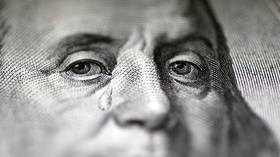Top currency economist points to accelerated pace of de-dollarization

The global shift away from the US dollar has increased tenfold since February 2022 compared to the previous 15 years, Stephen Jen, the CEO of Eurizon SLJ Capital Limited, told Die Welt on Thursday.
According to the former International Monetary Fund and Morgan Stanley economist, the majority of analysts are missing the trend because they evaluate the nominal value of central banks’ dollar holdings on the basis of data released by the IMF.
“However, if we take into account changes in the value of the dollar, then, according to our calculations, we’ll see that the dollar share in foreign reserves has lost about 11% since 2016,” Jen explained.
He argued that Washington’s decision to freeze Russia’s dollar reserves after the launch of Moscow’s military operation in Ukraine had been the decisive event.
“This has fueled fear and anxiety in Beijing, but also in other emerging countries,” he said, adding that holding reserves in US dollars had been always considered absolutely safe until the drastic move.
Jen explained that the BRICS countries had been increasingly focused on alternatives to the greenback.
According to the economist, since the BRICS group of emerging economies – which presently comprises Russia, Brazil, India, China, and South Africa, but is due to add six new members next year – the economic power of the union has multiplied. Iran, Saudi Arabia, the United Arab Emirates, Argentina, Egypt and Ethiopia will officially join the group in January 2024.
“Taking purchasing power into account, the BRICS nations currently account for 32% of global economic output, compared to 30% covered by the G7 countries,” he said.
For more stories on economy & finance visit RT's business section













